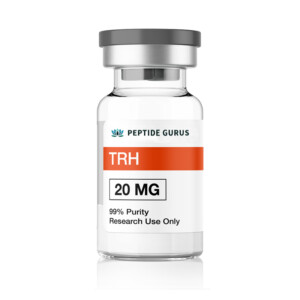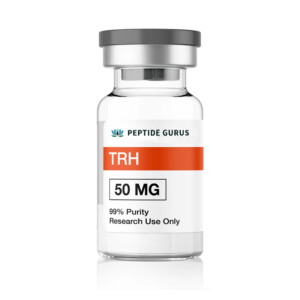In the complex world of neuroscience and mental health research, the
TRH (Thyrotropin – Releasing Hormone) thyrotropin peptide has been the subject of increasing interest, particularly in relation to its potential antidepressant effects. This article aims to explore this fascinating area, taking into account our product details from
this link and the latest FDA guidelines.
Understanding TRH Thyrotropin Peptide
TRH is a small peptide consisting of three amino acids (pyroglutamyl – histidyl – proline amide). It is produced mainly in the hypothalamus, a region in the brain that plays a crucial role in regulating various physiological processes. TRH’s primary function is to stimulate the release of thyroid – stimulating hormone (TSH) from the anterior pituitary gland. This, in turn, regulates the thyroid gland to produce thyroid hormones (thyroxine – T4 and triiodothyronine – T3), which are essential for maintaining normal metabolism, growth, and development in the body.
However, in recent years, researchers have discovered that TRH may have additional functions beyond its role in the hypothalamic – pituitary – thyroid (HPT) axis. There is evidence to suggest that TRH may also act as a neurotransmitter or neuromodulator in the central nervous system, which has led to investigations into its potential antidepressant properties.
The Link to Antidepressant Effects
Neurochemical Pathways
One of the proposed mechanisms by which TRH may exert antidepressant effects is through its influence on neurotransmitter systems. Serotonin, dopamine, and norepinephrine are well – known neurotransmitters involved in mood regulation. Studies have shown that TRH can interact with these neurotransmitter systems. For example, TRH may enhance the release of serotonin and norepinephrine in certain brain regions. By increasing the availability of these neurotransmitters, TRH could potentially improve mood and alleviate depressive symptoms.
HPT Axis Dysregulation in Depression
There is a well – established link between the HPT axis and depression. Many patients with major depressive disorder show abnormalities in the HPT axis, such as decreased TSH response to TRH stimulation. This suggests that dysregulation of the HPT axis may contribute to the development of depression. Since TRH is a key regulator of the HPT axis, it is hypothesized that normalizing the function of the HPT axis with TRH treatment could have a beneficial impact on depressive symptoms.
Clinical Studies
Some clinical trials have investigated the use of TRH as an antidepressant. In small – scale studies, intravenous administration of TRH has shown some promise in improving depressive symptoms in patients with treatment – resistant depression. However, more large – scale, well – controlled studies are needed to confirm these findings and to determine the optimal dosing, administration route, and long – term safety of TRH as an antidepressant.
FDA’s Role and Guidance
The FDA plays a crucial role in regulating the development and use of drugs, including peptides like TRH. Currently, TRH is not approved by the FDA as an antidepressant. The FDA’s approval process for new drugs is rigorous and requires extensive pre – clinical and clinical data to demonstrate safety and efficacy.
Safety Considerations
In terms of safety, potential side effects of TRH need to be carefully evaluated. Some of the common side effects associated with TRH administration include nausea, vomiting, flushing, and increased blood pressure. In rare cases, more serious side effects such as cardiac arrhythmias may occur. The FDA requires that all potential risks be thoroughly investigated in clinical trials before considering approval for a new indication.
Efficacy Evaluation
To gain FDA approval as an antidepressant, TRH would need to show significant improvement in depressive symptoms compared to placebo in well – designed, double – blind, randomized controlled trials. The endpoints for these trials would typically include measures such as changes in depression rating scales (e.g., the Hamilton Depression Rating Scale) and improvements in overall quality of life.
Our TRH Thyrotropin Product
Our TRH thyrotropin product comes in a 50 mg formulation. It is important to note that this product is intended for research purposes only. The product should be stored according to the recommended conditions to maintain its stability and integrity. When handling the product, researchers must follow strict ethical and scientific protocols.
The product’s purity and quality are of the utmost importance. We ensure that it meets high – quality standards to enable reliable research into the potential antidepressant effects of TRH, as well as other aspects of its biological functions.
FAQs
- Q: Can I use the TRH thyrotropin product from your website to treat my depression?
A: No, our TRH thyrotropin product is for research use only. It has not been approved by the FDA for the treatment of depression. Using it for self – treatment is not only illegal but also potentially dangerous as the safety and efficacy for this use have not been established.
- Q: What are the potential side effects if I were to take TRH for depression (even though it’s not approved)?
A: If TRH were to be used for depression, potential side effects could include nausea, vomiting, flushing, increased blood pressure, and in rare cases, cardiac arrhythmias. These side effects highlight the importance of not using unapproved substances for self – treatment.
- Q: How can researchers use your TRH thyrotropin product to study its antidepressant effects?
A: Researchers can use our product in in – vitro studies, such as cell culture experiments, to investigate how TRH interacts with neurotransmitter systems. In in – vivo studies, it can be administered to animal models of depression to observe changes in behavior and neurochemical markers related to mood regulation. However, all research must comply with ethical and scientific guidelines.

